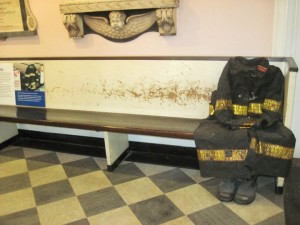The Myth of Closure - Part 2
 |
| Firefighter's Pew St. Paul's Chapel near Ground Zero |
“I hope it brings some comfort to the families. No closure. That word should be stricken from the English language.” - Lee Ielpi, whose son, Jonathan, a firefighter from Queens, died on 9/11 (quoted in the May 3, 2011 New York Times).
Much is made of the concept of closure. We’ve been told that certain things – an anniversary, a verdict, a discovery – can somehow end grief. Closure is considered the act of putting a period at the end of the sentence of grief.
Except there’s no such thing.
The death of Osama bin Laden has been heralded as closure for those who lost family and friends on 9/11, the end of the grieving. Now we can finally get back to normal and forget about what happened.
For some people, death is closure, after a loved one has suffered a long illness. For some people, getting to the first anniversary of someone’s death is closure, proof that you’ve survived your grief. Others can point to specific “signs” that made them feel better.
But for society to imply that one event – dramatic though it was – can end anyone’s grief is simplistic.
At my father’s wake, my girlfriend’s mother, who had lost her husband the year before said, “You don’t get over it; you just get used to it.”
For many people, bin Laden’s death will ease their minds. “Justice” has been served.
But make no mistake: their grief has not ended. For them, there can be no real closure.
At least not in this lifetime.

